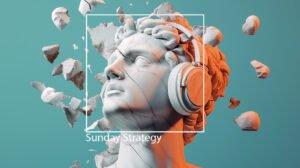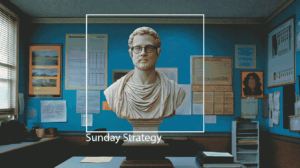As strategists in marketing, we look down the barrel of an AI led future and have to wonder, where do we fit into it? I wrote last year that I believe AI will help strategists get to better answers faster vs. rob us of a role and I still believe that.
However, as we look at greater capabilities from models and increased reasoning, it’s reasonable to wonder what defense we have against AI encroachment? What shifts the tide of automation towards being an asset, especially as more and more strategists will face self-employment as agencies consolidate towards efficiency?
Your Strategic Philosophy is Your Best Asset
As Sir John Hegarty once put it for creatives, ‘your creative philosophy is a business essential’ and this is no different for strategists. In a world where we can increasingly create anything, the reasoning behind creation is even more essential. In a world where increasing amounts of data, insight and observation are available, how these are woven into a story becomes integral to strategic success. How you uniquely see strategy and how you use it to direct the resources and development capabilities of others (both real and artificial), is what makes you indispensable.
In a world of increased freelancing, project scopes, fractional work, personal brands and more – what you stand for as a strategist is part of your calling card and your product. It is your storefront and your factory. In a world of generative AI, agents and automation, a philosophy acts as a guiding principle to how technology can augment your practice, it increasingly guides tools as much as it has guided teams historically.
AI Replicates What Exists, You Create Something New
This isn’t a new idea, as strategists who have progressed towards leadership roles in teams or departments already know. Junior strategists are expected to learn the craft from others, through a combination of collaboration, training, experience and frameworks. In the absence of a core, agreed ciriculum, developing strategists ingest the thinking of Byron Sharp, Ehrenberg-Bass Institute, Karen Nelson-Field PhD , Zoe Scaman, David Ogilvy, Gary Vaynerchuk, Les Binetand others – gaining mnemonics, statistics and structures that help deliver their line of thinking effectively.
However, as you develop, you have to do more than repeat. You have to build upon what you’ve learned to create something new – fashioning a synthesis of everything you know and believe into a strategic identity. It isn’t fixed, but as it develops and refines, you pass it down to others, contributing to their own development while imprinting that identity on a team or even an entire agency.
Building a Strategic Philosophy
Developing a ‘strategic philosophy’ sounds like a very self-important task to set yourself. However, odds are you already implicitly know it and those who have worked with you already have a sense of it as well. From what you like to what you don’t. From how you define the broad and unclear vocabulary of our industry to what you prioritize – each decision forms your philosophy.
The hardest part for a strategist isn’t to create a philosophy, but to refine it down to something easily understandable – to hone in a similar fashion to how Binet defined the industry.
So where do you start? There are no right or wrong answers, but some starting points can come from:
- Definition: How do you uniquely define some of the broader terms within the industry? What is your definition of marketing, advertising, brand or even strategy? What stands as a ‘good’ example of each?
- Difficulties: What stops good strategy from being ‘good’? What are our biggest issues to solve? What holds back effectiveness?
- Deliverables: What does every good strategy have? What stands out as a key element of how a strategy is constructed?
- Distribution: How do you believe strategy is best communicated? What type of tone, language and length do you believe is effective when sharing it with others? How do you brief?
These are just a few ways to think about developing a philosophy as a strategist, but they aren’t exhaustive. The shorter, sharper and more compelling you can be, the more people understand why your view of the industry and the world diverges from others. If you’ve done your job well, people will disagree with you – and if you’ve done your job very well, both people and AI will be more easily be able to follow you and your thinking.



